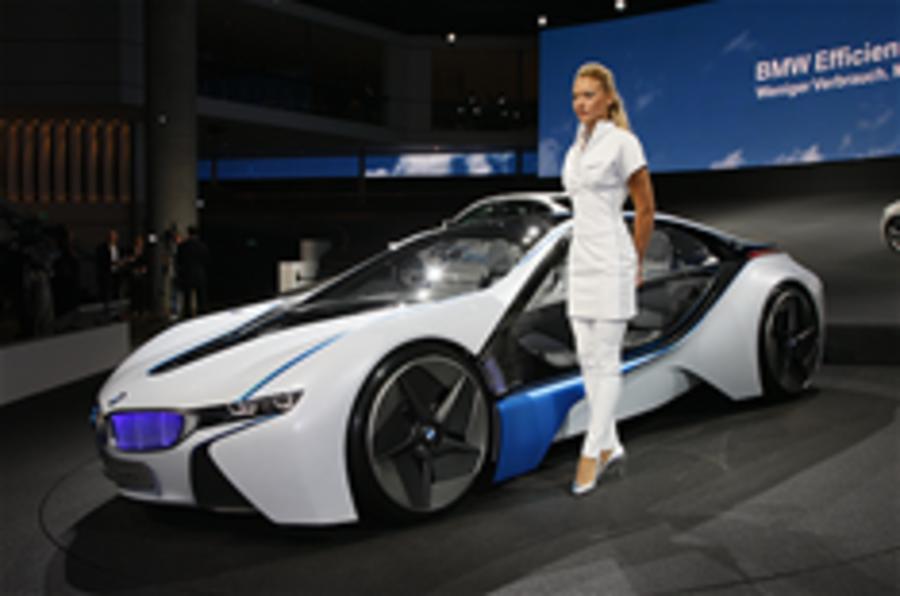BMW has revealed the future of its performance cars with a spectacularly styled concept that matches M3-rivalling performance to Mini levels of fuel economy. It was officially unveiled at the Frankfurt motor show.
The Vision Efficient Dynamics concept is a showcase for BMW’s lightweight body construction, advanced hybrid-drive technology and new packaging and aerodynamic ideas.
Many of these features are under development at BMW’s FIZ R&D base, and will be used on forthcoming BMW road cars, including a new range-topping sports car, the Z10 ED, which is due by around 2015.
The concept is roughly the size of a 3-series coupé, at 4600mm in length, 1900mm in width and 1240mm in height, but it demonstrates its supercar credentials with a considerably lower roofline.
At the heart of the Vision Efficient Dynamics is a diesel-electric hybrid system. The engine is a turbocharged 1.5-litre, three-cylinder powerplant that will be introduced in 2011 in the next 1-series. Other BMW models, including the next 3-series, will then adopt the motor.
With 163bhp and 214lb ft of torque, the engine is more powerful than the latest and most economical version of BMW’s existing 2.0-litre, four-cylinder turbodiesel. It uses the Getrag seven-speed double-clutch gearbox that was introduced on the M3, albeit with new shift programs and unique ratios.
The diesel engine is supported by a pair of electric motors mounted at the front of the gearbox. One of them supplies drive to the rear wheels, the other powers the front wheels via a single-speed reduced-ratio transmission.
The rear motor has 34bhp and 214lb ft, although it can achieve 51bhp for short bursts. The motor acting on the front wheels delivers 80bhp and 162lb ft, but can supply up to 139bhp momentarily. Altogether, BMW’s new diesel-electric hybrid system is rated at 356bhp and 590lb ft.
This endows the 1395kg Vision Efficient Dynamics with a power-to-weight ratio of 255bhp per tonne, or just 7bhp per tonne below that of the current 414bhp 4.0-litre V8 M3. It’s not surprising, then, that it is claimed to go from 0-62mph in 4.8sec and on to an electronically limited top speed of 155mph. Those figures match the M3’s.
Fuel economy is much improved over the M3, though; the combined fuel consumption figure is 75.1mpg and CO2 emissions are just 99g/km; both figures are comparable to those of the Toyota Prius.
The batteries are charged by regenerative braking or by plugging the car into the mains; there’s a socket located in the right front wing. When the car is hooked up to a standard 220V/16A system, overall recharge time is put at two and a half hours. At a higher 380V and 32A this is reduced to just 44 minutes. The battery pack, sited within the central chassis tunnel, weighs 85kg.





Join the debate
Add your comment
Re: BMW's eco sports car concept
This is the freshest car style since Mazda started their Nagare concepts. One of those remind me of this, the Furai concept race car: http://www.seriouswheels.com/2008/klm/2008-Mazda-Furai-Concept-Debut-160...
Re: BMW's eco sports car concept
so you are getting bored about news storys regarding the company that is leading the pack in eco-friendly tech?
Get used to it, not that i like it, but the eco-friendly stuff is here to stay. I would say that BMW have been really quite quiet about all this. Audi have now started advitising having start-stop (note the stupid light bulb add on TV), BMW have had it for years now and havent been blabing about it!
Also JL4069 I think the point of this car is to show what WILL be on the mainstream cars like the 1 and 3 series. I also think they are pretty serious about, are they not the company that has reduced its CO2 per unit the most in the car industry in recent years?
I see your point about weight, but that is very narrow thinking, you could build the entire car from Aliminium but the amount of oil used to produce the ali, would be more than the car would ever save!! What about carbon fibre? well this cant be recycled, it has to be simply sent to land fill.
BMW have reverted to a steel chassis for the new 5 series for this very reason, its easy to manufacture, and its very easy to recycle.
Re: BMW's eco sports car concept